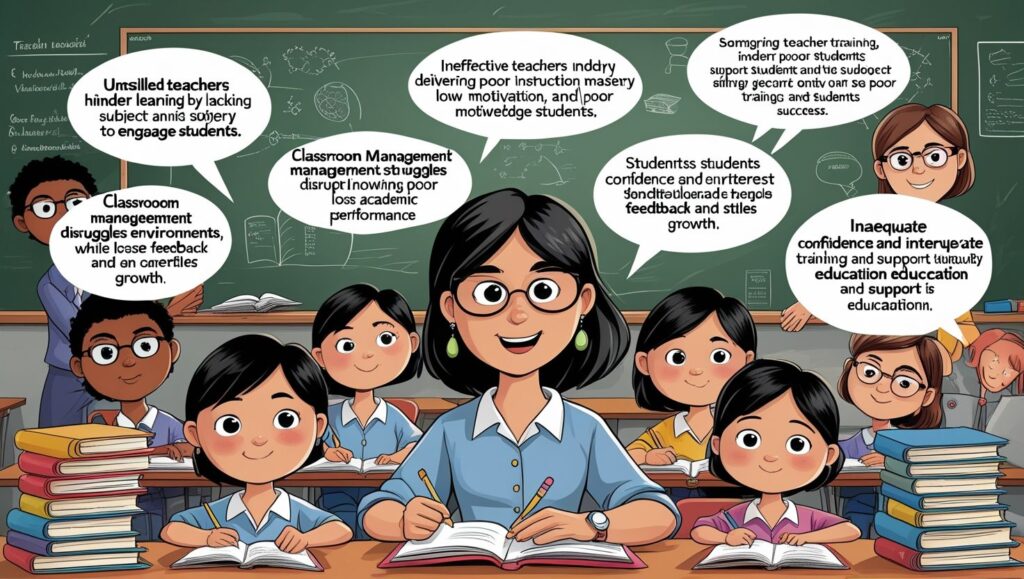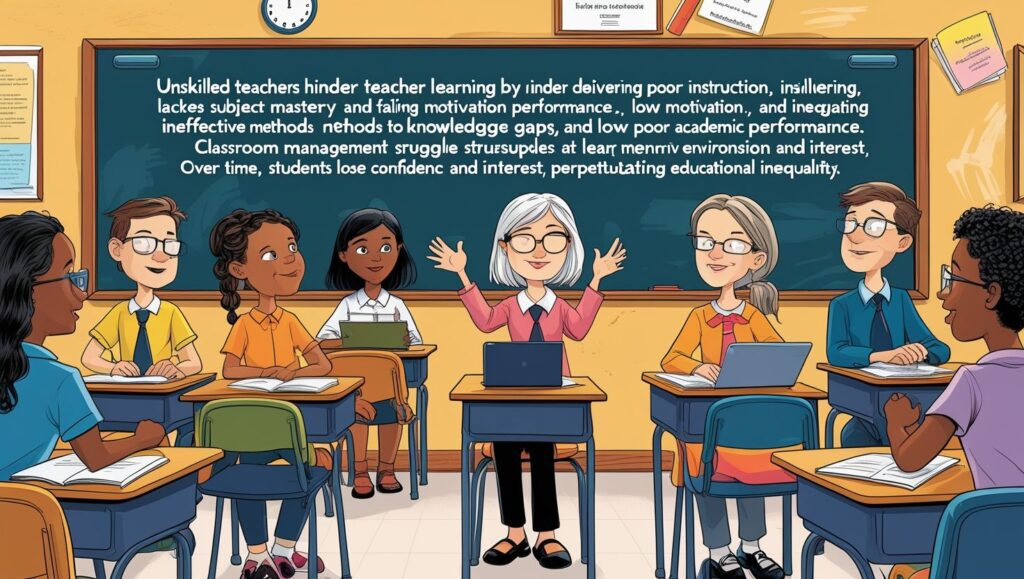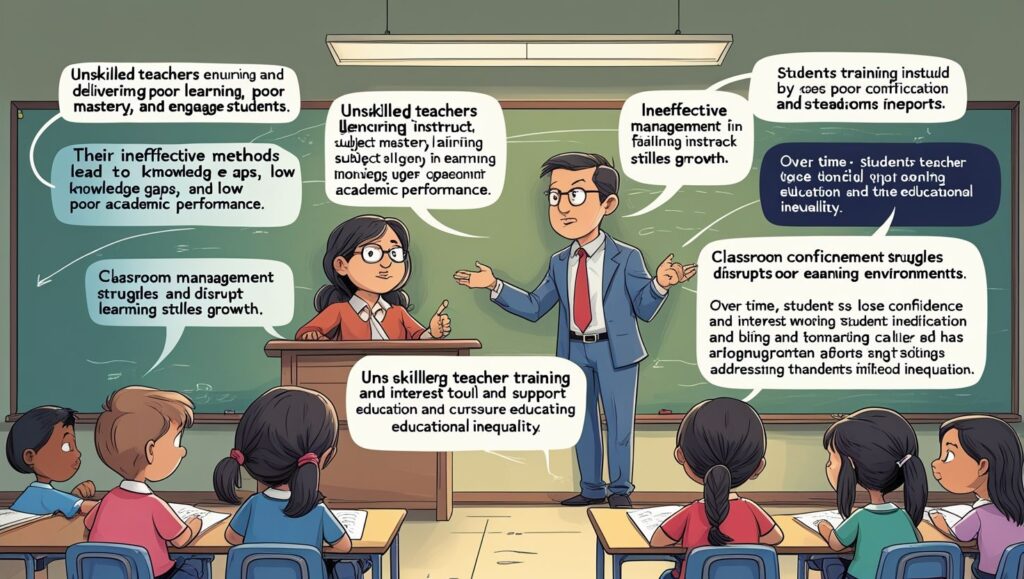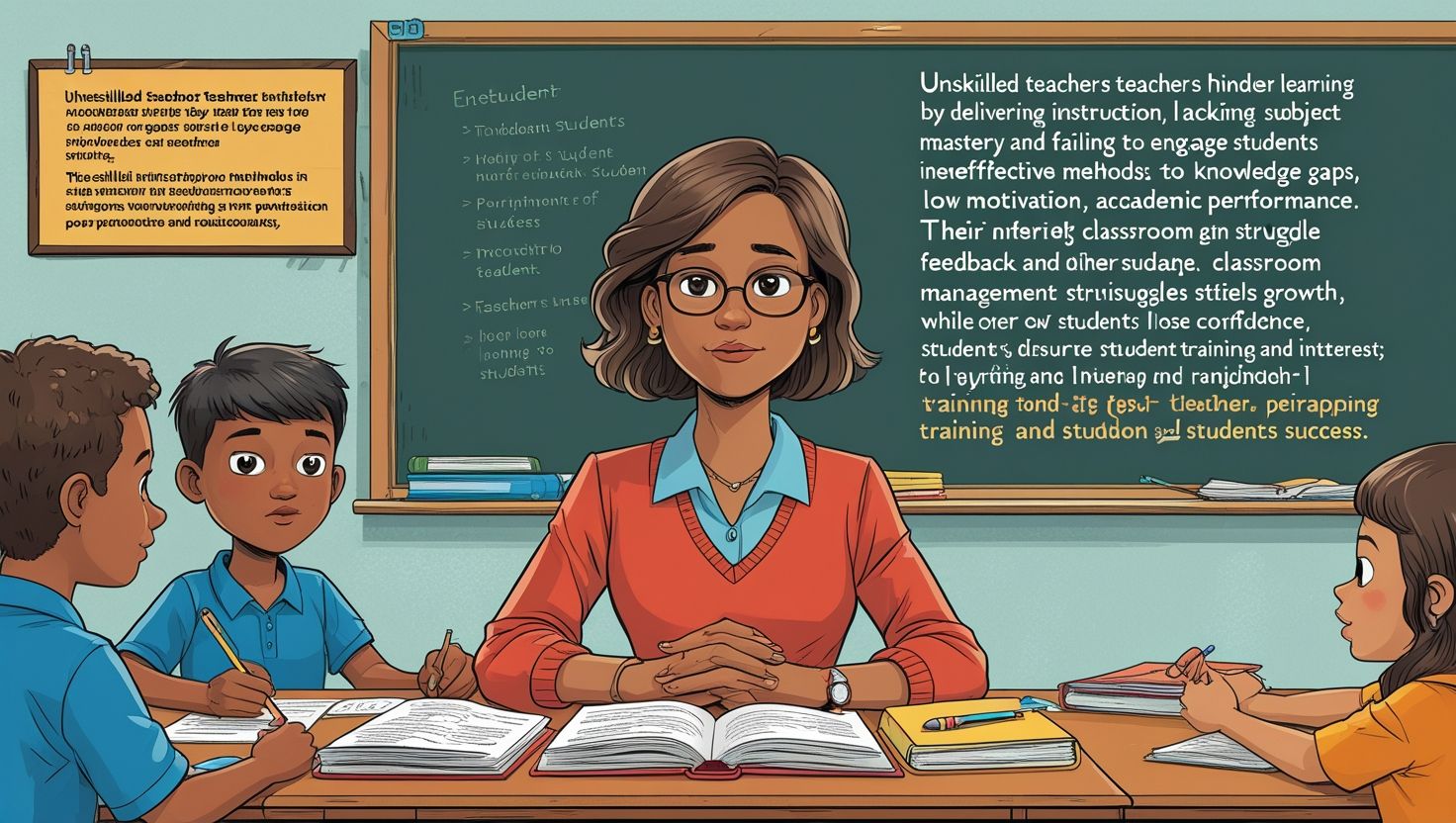1. Introduction
Unskilled Teachers’ Impact on Learning, In the evolving world of education, the quality of teachers holds a fundamental place in shaping students’ academic and social growth. Unskilled teachers—those who lack proper training, subject mastery, and pedagogical techniques—can severely hamper learning outcomes. While many nations invest heavily in infrastructure and curriculum design, the absence of skilled teachers makes these efforts futile. An unskilled teacher not only struggles to deliver lessons effectively but also fails to inspire curiosity, critical thinking, and independent learning among students.
The purpose of this article is to examine how unskilled teachers affect the academic, emotional, and behavioral development of learners. We will also explore how their inadequacies weaken the educational ecosystem as a whole. By identifying the gaps and consequences associated with unskilled teaching staff, stakeholders can better understand the urgency of professional training, certification, and recruitment strategies. Addressing this concern is essential if we are to achieve equity, quality, and excellence in education across all levels.
2. Definition of an Unskilled Teacher
An unskilled teacher refers to an individual engaged in the teaching profession without the necessary educational qualifications, pedagogical training, or subject expertise. Unlike professionally trained educators, these teachers may enter classrooms lacking knowledge of instructional strategies, curriculum planning, classroom management, and assessment techniques. Some may possess content knowledge but lack the soft skills and methods to effectively transfer knowledge to students.
Others may teach subjects outside their expertise due to staffing shortages, leading to further inefficiency. In some regions, especially in rural and underserved areas, teachers may begin their careers without certification or adequate training programs. The absence of required competencies not only undermines the teaching process but also diminishes students’ trust in education. Unskilled teachers may resort to rote learning methods, skip critical thinking exercises, and use outdated practices that do not cater to modern learners. Their presence is a symptom of systemic weaknesses in educational planning, recruitment, and professional development strategies.
3. Poor Academic Performance Among Students
One of the most direct outcomes of having unskilled teachers is poor academic performance among students. When educators are unable to convey lessons effectively or assess understanding appropriately, students fail to grasp key concepts. This leads to lower test scores, weak foundational knowledge, and increased dropout rates. An unskilled teacher may misinterpret the curriculum, teach inaccurate content, or fail to recognize when students need additional help.
This gap becomes more critical in core subjects such as mathematics, science, and language, where logical understanding and practice are essential. Additionally, unskilled teachers often lack differentiation strategies, meaning they cannot tailor lessons to meet individual student needs. As a result, both advanced and struggling learners suffer. The long-term implications are damaging—students may lose interest in school, develop a negative self-image, or fail to qualify for higher education opportunities. Ultimately, the academic deficiencies caused by unskilled educators contribute to the widening achievement gap within educational institutions and society.

4. Lack of Classroom Management
Effective classroom management is a skill developed through training and experience. Unskilled teachers often struggle to establish and maintain discipline, leading to chaotic learning environments. They may lack the strategies needed to prevent disruptions, handle behavioral issues, or motivate disengaged students. As a result, more time is spent on managing conflicts than on actual teaching. Inconsistent discipline can confuse students and reduce their respect for authority.
In extreme cases, mismanagement can lead to bullying, absenteeism, and teacher burnout. Without structure, learners are unable to focus, collaborate, or participate effectively in classroom activities. Furthermore, a poorly managed class often creates anxiety among students, especially those who thrive in organized settings. The emotional stress caused by such environments can stunt cognitive and social growth. For students to succeed, they require a space that fosters safety, focus, and engagement—outcomes rarely achieved under the guidance of an unskilled educator who lacks classroom control.
5. Failure to Use Effective Teaching Methods
Teaching is not just about speaking in front of students—it involves choosing the right strategies to facilitate learning. Unskilled teachers frequently rely on outdated or ineffective methods, such as rote memorization, long lectures, or one-size-fits-all approaches. They may not be aware of active learning techniques like group discussions, inquiry-based learning, or project-based assessments. As a result, students are often passive recipients of information rather than active participants in their education.
Furthermore, unskilled educators struggle to use formative assessments to guide instruction or integrate feedback into their teaching. In the age of digital learning and learner-centered pedagogy, such teachers are left behind. Students taught through ineffective methods may struggle to apply knowledge in real-world contexts, think critically, or collaborate with peers. These shortcomings can impact lifelong learning and career readiness. Therefore, the inability to use effective teaching methods creates a ripple effect that extends far beyond the classroom and into students’ futures.
6. Lack of Subject Knowledge
A teacher who lacks deep understanding of the subject matter cannot teach with confidence or clarity. Unskilled teachers often deliver incorrect information, struggle to answer questions, and avoid deeper explanations. Students may sense their teacher’s insecurity, which undermines the credibility of the learning process. This not only confuses learners but also leads to misconceptions that are difficult to correct later. In subjects such as science, history, or literature, where context and interpretation matter, inadequate subject knowledge limits discussion and exploration.
Additionally, teachers without a solid content base cannot design meaningful activities, assessments, or real-life applications. Their instruction tends to be shallow, repetitive, and disengaging. This gap particularly affects students preparing for exams, competitions, or higher education. They may perform poorly due to incomplete or inaccurate understanding. In the long run, such limitations diminish students’ chances of academic success, job readiness, and informed citizenship.
7. Reduced Student Motivation
Motivation is a critical driver of learning. When teachers lack passion, preparedness, or engagement, students quickly lose interest in their studies. Unskilled educators often appear disinterested, unenthusiastic, or ill-prepared, sending a message that learning is unimportant or boring. These teachers rarely provide encouragement, use diverse materials, or recognize student achievements—key factors that sustain motivation. Furthermore, students become frustrated when they don’t understand lessons or feel unsupported, especially when teachers cannot adapt their approach. The absence of motivation leads to disengagement, incomplete assignments, and decreased class participation.
Over time, learners may stop attending school regularly or develop negative attitudes toward education. Skilled teachers act as role models and mentors, but unskilled teachers fail to inspire or nurture learners’ dreams. This can be particularly damaging for students from marginalized backgrounds, who may rely on education as their primary path to upward mobility. Hence, the lack of motivation fostered by unskilled teachers has far-reaching emotional and academic consequences.

8. Ineffective Use of Technology
In today’s digital world, the integration of technology into education is essential. However, unskilled teachers often lack the knowledge or confidence to incorporate digital tools into their instruction. They may avoid using projectors, online resources, educational software, or virtual collaboration platforms. Consequently, students miss out on engaging and interactive experiences that enhance learning. Furthermore, technology can be a powerful equalizer—offering personalized learning opportunities, instant feedback, and access to global knowledge.
When teachers fail to utilize it, they limit students’ exposure to modern skills and knowledge. Unskilled educators may also be unable to manage online learning environments, particularly relevant in hybrid or remote learning settings. During global disruptions such as the COVID-19 pandemic, the digital divide was worsened by teachers who lacked tech competency. Learners taught by such educators fall behind in digital literacy, a crucial skill for academic and professional success. Hence, ineffective use of technology is another significant drawback of having unskilled teachers in the system.
9. Inadequate Student Assessment
Assessment is a critical component of the teaching-learning process. It informs instruction, identifies learning gaps, and measures progress. Unskilled teachers often fail to design valid, reliable, or diverse assessment tools. They may rely solely on written exams, neglecting oral tests, practicals, or project work. Furthermore, their assessments might not align with learning objectives or educational standards. These teachers may also struggle with grading fairly, providing constructive feedback, or using assessment data to inform future teaching.
As a result, students receive little guidance on how to improve, and their true abilities remain unidentified. This is particularly detrimental to students with learning differences, who need tailored evaluation approaches. The lack of effective assessment also affects academic records, career planning, and school reputation. In contrast, skilled educators view assessment as a continuous and formative process, integral to student growth. Therefore, inadequate assessment practices from unskilled teachers result in misdiagnosed abilities and unaddressed educational needs.
10. Weak Parent-Teacher Communication
Strong parent-teacher communication builds trust and enhances student outcomes. However, unskilled teachers often struggle to maintain open, respectful, and effective communication with parents. They may avoid meetings, lack documentation, or use inappropriate language. This leads to misunderstandings, frustration, and a breakdown in collaboration between school and home.
In such situations, they cannot provide the necessary support at home, and students miss out on a consistent support system. Moreover, unskilled teachers may react defensively to parental concerns rather than viewing them as opportunities for improvement. Their inability to handle conflict or build partnerships reflects poorly on the school and reduces parental engagement. In contrast, skilled educators welcome feedback, involve parents in decision-making, and create bridges between home and school. Therefore, the lack of effective communication by unskilled teachers negatively impacts the holistic development of students and the educational environment at large.
11. Negative Impact on School Reputation
Teachers are the face of any educational institution. When schools employ unskilled teachers, their reputation suffers. Parents, students, and the community judge the quality of education largely based on teacher performance. Unskilled teachers who deliver poor results, mishandle classrooms, or create disciplinary issues reflect poorly on the entire institution. This can lead to decreased enrollment, negative word-of-mouth, and reduced funding from donors or government bodies.
Furthermore, schools with a high turnover of unskilled teachers often face instability, affecting student learning and staff morale. Prospective staff may avoid applying to such institutions, worsening the talent pool. Over time, the school becomes synonymous with poor academic performance and low standards. In competitive education markets, this tarnished image can be difficult to repair. Therefore, hiring and retaining qualified educators is essential not only for student success but also for preserving the school’s credibility and community trust.
12. Impact on Teacher Morale
The presence of unskilled teachers can affect the morale of the entire teaching staff. Skilled educators may feel frustrated when they have to compensate for their colleagues’ inadequacies. They may be overburdened with mentoring responsibilities or have to address student gaps left by untrained peers. This can lead to professional burnout, resentment, or disengagement.
In some cases, tensions may arise among staff, disrupting collegiality and teamwork. Administrators may also become disillusioned when professional development programs yield limited improvement among unskilled teachers. The overall school culture becomes strained, and innovation slows down. Conversely, a team of competent, passionate teachers creates a dynamic and supportive work environment. Therefore, unskilled teachers not only impact students but also diminish the spirit, collaboration, and performance of their colleagues.\
7. Emotional Toll on Students
The presence of unskilled teachers can have a detrimental emotional impact on students. An unskilled teacher may lack empathy, patience, and proper communication skills, which are vital for creating a psychologically safe learning environment. Students may feel neglected, misunderstood, or harshly judged, which can cause anxiety and reluctance to engage in classroom activities. When students are exposed to repeated episodes of emotional disconnection or embarrassment, they can begin to associate learning with fear or stress.
This emotional turmoil may not only affect their current academic performance but also their long-term attitudes toward education. Furthermore, children who face continuous emotional challenges in school may develop low self-esteem, leading to behavioral issues or withdrawal. Such emotional imbalances can significantly hinder their social and academic development. The emotional toll becomes more severe if students are not offered appropriate support from home or other teachers. Hence, it is critical to recognize that effective teaching is not only about curriculum delivery but also about nurturing student well-being.

8. Hindrance to Inclusive Education
Inclusive education aims to provide equal learning opportunities for all students, including those with diverse needs, backgrounds, and abilities. However, unskilled teachers often lack the training and mindset necessary to support inclusive practices. They may be unfamiliar with differentiated instruction, fail to recognize learning disabilities, or harbor unconscious biases that lead to exclusionary behavior. As a result, students who require special attention or accommodations may be marginalized, leaving them frustrated and disconnected from the learning process.
A lack of cultural sensitivity and an inability to manage diverse classrooms can further exacerbate the problem. This undermines the goals of inclusive education by creating an environment where only students who fit a narrow mold succeed, while others are left behind. Without professional development and awareness, unskilled teachers may unknowingly foster discrimination and hinder social integration. In contrast, skilled teachers are trained to create equitable learning environments that embrace diversity. Therefore, for inclusive education to be effective, teacher competency in inclusive strategies is essential.
9. Reduced Academic Standards
The academic standards of a school or educational institution are directly influenced by the quality of its teaching staff. When unskilled teachers dominate the teaching workforce, the academic standards inevitably decline. These teachers may fail to design appropriate lesson plans, set challenging yet achievable goals, or effectively assess students’ progress. The lack of alignment with national or regional academic benchmarks results in students underperforming, even if assessments are adjusted to inflate grades artificially.
Over time, this decline in standards leads to a devaluation of the institution’s reputation and the qualifications it issues. Students taught under such conditions often struggle when they transition to higher levels of education, where expectations are more rigorous. This creates a gap between actual learning and perceived competence, diminishing their chances of academic and professional success. Furthermore, low academic standards make it difficult for institutions to participate in global academic partnerships or maintain accreditation. Therefore, ensuring skilled teachers are in place is fundamental to upholding academic integrity and excellence.
10. Weak Professional Role Modeling
Teachers are more than knowledge dispensers—they are role models who shape students’ attitudes, values, and aspirations. Unskilled teachers often fail in this critical area of influence. Their inability to demonstrate professionalism, time management, ethical behavior, or lifelong learning sends the wrong message to students. Children and adolescents are highly impressionable; when they observe apathy, disorganization, or disrespect from teachers, they may internalize such behaviors as acceptable.
In contrast, skilled teachers inspire students through their dedication, continuous self-improvement, and respectful conduct. Unskilled teachers, however, may inadvertently promote complacency and mediocrity, undermining the development of students’ sense of responsibility and ambition. A lack of engagement or interest from the teacher may discourage students from aspiring to noble professions or from taking education seriously. Over time, this can affect not just individuals but also society by limiting the emergence of morally sound, socially responsible citizens. Hence, having teachers who are both competent and professionally ethical is vital for molding future generations.
11. High Dropout Rates
There is a direct correlation between poor teaching and high student dropout rates. Unskilled teachers often fail to capture students’ interest or provide the academic and emotional support needed to sustain them through the challenges of schooling. When learners consistently encounter failure, confusion, or neglect, they may lose motivation and self-confidence, prompting them to disengage from school altogether. In underserved or vulnerable communities, where education is already at risk, the presence of ineffective teachers can be the final factor pushing students to abandon school.
Additionally, students may find the learning environment hostile or boring, especially if it lacks relevance and engagement—further contributing to absenteeism and eventual dropout. This is particularly alarming as high dropout rates perpetuate cycles of poverty and limit opportunities for socioeconomic mobility. Preventing dropouts requires teachers who are proactive, nurturing, and adaptive in their instruction. Skilled educators can identify at-risk students early and implement interventions that encourage persistence. Thus, investing in teacher training is a preventive measure against systemic educational failure.
12. Solutions and Recommendations
Addressing the impact of unskilled teachers requires a multi-faceted approach involving policy reform, institutional support, and community involvement. First and foremost, governments and educational bodies must implement rigorous teacher qualification standards and continuous professional development programs. Recruitment should focus not only on academic credentials but also on teaching aptitude, communication skills, and adaptability. Once employed, teachers should undergo regular training in pedagogy, classroom management, and emerging educational technologies.
Mentorship programs pairing novice teachers with experienced educators can also improve practical classroom effectiveness. In-service workshops and certifications should be made mandatory to keep teaching skills current. Furthermore, schools must establish clear evaluation mechanisms to monitor teaching quality, using both student feedback and administrative oversight. Incentives for excellent performance and consequences for persistent underperformance can help maintain high standards. Lastly, community engagement through parent-teacher associations and local education boards can hold schools accountable. By implementing these strategies, the negative impact of unskilled teachers can be mitigated, leading to a stronger, more equitable educational system.
Conclusion:
The presence of unskilled teachers in educational systems poses significant risks to the intellectual, emotional, and social development of students. From poor classroom engagement and mismanagement to diminished academic standards and increased dropout rates, their inadequacies disrupt the entire learning process. Unskilled teachers often struggle with communication, lack instructional creativity, and are unable to foster critical thinking or inclusive learning environments. The resulting emotional toll on students—including stress, anxiety, and demotivation—further compounds the harm. Moreover, when teachers fail to model professionalism and ethical conduct, they jeopardize the formation of positive student values and aspirations.
The cumulative effect of these deficiencies is a weakened education system that fails to prepare learners for higher education, employment, or civic life. However, these challenges are not insurmountable. Systemic reforms that prioritize teacher training, ongoing professional development, rigorous evaluation, and community accountability can significantly improve teaching quality. Ultimately, skilled teachers are the backbone of a successful education system. Ensuring that every classroom is led by a capable and compassionate educator is not just a necessity—it is a moral and societal imperative for sustainable progress and national development.

Very insightful and well-written. I learned a lot from this! Pls check my website: https://emopat.xyz/ !
I really like the way you approach this topic.
Yesterday, while I was at work, my cousin stole my apple ipad and tested to see if it can survive a forty foot drop, just so she can be a youtube sensation. My iPad is now destroyed and she has 83 views. I know this is entirely off topic but I had to share it with someone!
My brother recommended I might like this blog. He was entirely right. This post truly made my day. You can not imagine simply how much time I had spent for this information! Thanks!
Este site é realmente fascinate. Sempre que consigo acessar eu encontro coisas incríveis Você também vai querer acessar o nosso site e saber mais detalhes! informaçõesexclusivas. Venha descobrir mais agora! 🙂
Este site é realmente incrível. Sempre que consigo acessar eu encontro coisas diferentes Você também vai querer acessar o nosso site e descobrir detalhes! Conteúdo exclusivo. Venha saber mais agora! 🙂
Este site é realmente fantástico. Sempre que acesso eu encontro coisas diferentes Você também pode acessar o nosso site e descobrir mais detalhes! Conteúdo exclusivo. Venha descobrir mais agora! 🙂
Terrific work! This is the type of info that should be shared around the web. Shame on the search engines for not positioning this post higher! Come on over and visit my site . Thanks =)
Hi my friend! I want to say that this article is awesome, great written and include almost all significant infos. I would like to look extra posts like this .
Thank you for sharing with us, I conceive this website truly stands out : D.
I have not checked in here for a while since I thought it was getting boring, but the last several posts are great quality so I guess I will add you back to my everyday bloglist. You deserve it my friend 🙂
I have been absent for some time, but now I remember why I used to love this web site. Thank you, I will try and check back more frequently. How frequently you update your website?
Excellent post. I was checking continuously this blog and I’m inspired! Very helpful info specially the final section 🙂 I take care of such information much. I used to be looking for this particular info for a very long time. Thanks and best of luck.
Thank you for sharing superb informations. Your web site is so cool. I’m impressed by the details that you have on this web site. It reveals how nicely you understand this subject. Bookmarked this website page, will come back for extra articles. You, my pal, ROCK! I found just the information I already searched everywhere and simply could not come across. What a perfect web site.
Thank you for sharing with us, I believe this website genuinely stands out : D.
Hello, you used to write wonderful, but the last several posts have been kinda boringK I miss your tremendous writings. Past several posts are just a little out of track! come on!
I do not comment, however I read a feww of the remarks on Unskilled
Teachers' Impact on Learning – Teacher's Guide.
I do have 2 questions for you if it’s okay. Is it simply
mee or do some of the comments appear like they are coming from brain dead visitors?
😛 And, if you are writing on other social sites, I’d like to ffollow anything fresh you have to post.
Could you make a list of all of your shared sites like your
Facebook page, twitter feed, or linkedin profile? https://glassiuk.wordpress.com/
certainly like your web-site but you have to test the spelling on quite a few of your posts. Many of them are rife with spelling problems and I to find it very troublesome to inform the reality then again I will certainly come again again.
Terrific work! This is the type of info that should be shared around the internet. Shame on Google for not positioning this post higher! Come on over and visit my web site . Thanks =)
I am not really excellent with English but I find this rattling leisurely to understand.